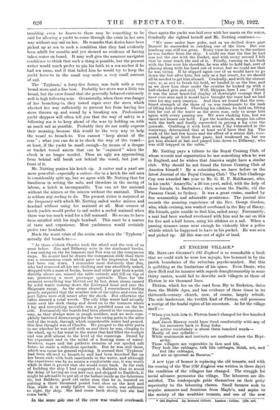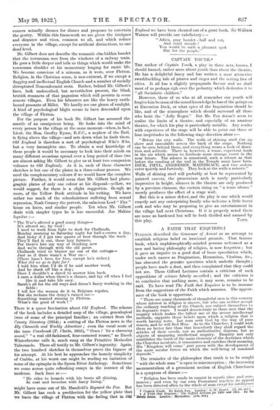AN ENGLISH VILLAGE.*
Mx. BERNARD GILBERT'S Old England is so remarkable a book that we could wish he were less myopic, less hemmed in by the parish boundaries of the suburban psycho-analyst. But this is quibbling at the limitations of his space. Even Dante, who drew Hell and its inmates with superb draughtsmanship in some thirty cantos, would fail to describe such villagers as those of Fletton in six thousand lines.
Fletton, which lies on the read from Bly to Barkston, dates from the Middle Ages, and has evidence of those times in its thirteenth-century church, now, of course, largely rebuilt. The sole landowner, the twelfth Earl of Fletton, still possesses a vestige of the feudal rights of his ancestors. As for the village itself :— " When you look into it, Fletton hasn't changed for five hundred years,
And Jacob Harvey could have lived comfortably with any of his ancestors back to King John.
The active vocabulary is about three hundred words— Mostly of one syllable—
While sentiments and instincts are unaltered since the Hept- archy.
These villagers are vegetables in face and life,
They look like cabbages, talk like cabbages, think, act, and feel like cabbages, And are as ignorant as Basutos."
A new type of farmer is replacing the old tenants, and with the coming of the War (Old England was written in those days) the condition of the villagers has changed. The struggle for social advance permeates the village. The labourers are dis- satisfied. The tradespeople pride themselves on their petty superiority to the labouring classes. Small farmers seek to acquire manners and furniture from Maple's, and aspire to the society of the wealthier tenants, and one of the new • Old England. By Bernard Gilbert. London : Collies. [20e. net.
comers actually dresses for dinner and proposes to entertain the gentry. Within this framework we are given the intrigues and disputes and vices, common to all, and which reduce everyone in the village, except for artificial distinctions, to one dead level.
Mr. Gilbert does not describe the romantic elm-hidden hamlet that the townsman sees from the windows of a railway train. He goes a little deeper and tells us things which would make the townsman shudder at his momentary longing for rustic life. We become conscious of a miasma, as it were, over Fletton.
Religion, in the Christian sense, is non-existent, if we except a flagging and ineffectual English Church and a number of socially disruptured Nonconformist sects. Rather, behind Mr. Gilbert's lines, lurk undescribed, but nevertheless present, the blind,
brutish remanets of that paganism which still persists in some remote villages. Even his labourers are like the heavy earth- bound peasants of Millet. We hardly see one gleam of sunlight. A kind of psychological blight seems to have descended upon the village of Fletton.
For the purpose of his book Mr. Gilbert has assumed the mantle of an omnipotent being. He looks into the mind of every person in the village at the same moment—when, in fact, Lieut. the Hon. Geoffry Kyme, R.F.C., a nephew of the Earl, is flying above the village—and sets down what he finds there.
Old England is therefore a sort of psychological Who's Who, but a very incomplete one. To obtain a real knowledge of these people it would be necessary to look into their minds on many different occasions spread over a long period of time (we are almost asking Mr. Gilbert to give us at least two companion volumes to Old England). As it is, each of these character sketches is but one of the plates in a three-colour process. We need the complementary colours if we would know the complete picture. Further, it would seem that Mr. Gilbert had photo- graphic plates of only one colour at his disposal—yellow, we would suggest, for there is a slight suggestion, though no more, of the Yellow Book attitude in his writing. We have rather too much of the schoolmistress suffering from sexual repression, Noah Creasey the pervert, the salacious Lord " Fitz " home on leave, and similar people. Yet when Mr. Gilbert
deals with simpler types he is les3 successful. Joe Mslrins loquitur :- " The War's altered a good many things— It's altered me, by God !
I used to work from light to dark for Challands, Monday morning to Saturday night for half-a-crown a day, And lucky if I got two quarts of beer through the week. They'll find it out, these lazy farmers, For there's lots my way of thinking now And we're through with the old game.
Challands tried to bluster me out of the cottage— Just as if there wasn't a War on—
(There hasn't been for him, except he's richer.) What did we go to fight for ?
I told him what I'd do if he said another word,
And he slunk off like a dog ;
Once I shouldn't a dared to answer him back.
I earn a dollar when there's a chance, and lay off when I feel
like it and take life easy.
Sarah's all for the old ways and doesn't fancy working in the fields :
I tell hor the women do it in Belgium regular, But she reckons the Army's ruined me—
Something wanted raining in Fletton.
What's the good of work ? "
There is a queer fascination about Old England. The scheme of the book includes a detailed map of the village, genealogical
trees of some of the principal families ; an extract from the County Directory (1914) ; a cutting of the Fletton news in the Bly Chronicle and Weekly Advertiser ; even the vocal score of
the tune Cranbrook (T. Clarke, 1805), " Grace / 'tie a charming sound," " a real old-fashioned, four-cornered rouser," as Enoch Winterbourne calls it, much sung at the Primitive Methodist Tabernacle. These all testify to Mr. Gilbert's ingenuity. Again, the two hundred sketches in themselves prove the bigness of his attempt. At his best he approaches the homely simplicity of Crabbe, at his worst one might be reading an imitation of some of the epitaphs in the Spoon River Anthology. Sometimes we come across quite refreshing essays in the manner of the moderns. Such lines as :-
" He rides to hounds with his boots all shining, In coat and breeches with fancy lining,"
might have come out of Mr. Masefield's Reynard the Fox. But Mr. Gilbert has such a predilection for the yellow plate that 'we leave the village of Fletton with the feeling that in Old
England we have been cheated out of a great book. Sir William Watson will provide our valedictory :- "Adieu, gray hamlet—hall and cot, And ivied steeple !
You would be such a pleasant spot But for the people."



































 Previous page
Previous page